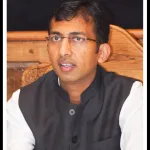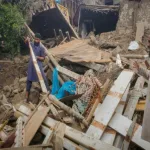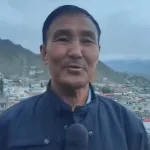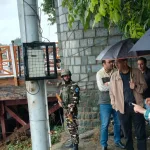Omar Abdullah recently spoke at an event in New Delhi, stating that the current peace in Jammu & Kashmir is “forced” and “inorganic,” resulting from fear rather than genuine stability. He emphasised that if the peace were genuine, the Modi Government wouldn’t have placed Mirwaiz Umar Farooq under house arrest to prevent him from attending his father-in-law’s funeral prayers.
At an event organised by The Red Mike in New Delhi, on invitation from senior journalist Sanket Upadhyay, I asked Omar Abdullah to share his experience by comparing Kashmir situation in 2010 with 2025 – while he was Chief Minister of Jammu & Kashmir. A visibly shaken and angry Abdullah instead went on a diatribe to criticise removal of statehood and Article 370 in J&K while personally addressing the journalist. Omar’s reaction was quite telling while I had no intention to trigger the Chief Minister.
Omar Abdullah’s recent peace overtures in New Delhi ring hollow, given his past actions as Chief Minister of Jammu & Kashmir. Conveniently forgotten is his role in placing Mirwaiz Umar Farooq and other Kashmiri separatists under house arrest on multiple occasions between 2009 and 2014. In fact, Abdullah’s administration resorted to this tactic at least 20 times, often to prevent separatist leaders from attending public events or rallies.
For instance, ahead of the 2014 assembly elections, Abdullah’s government placed Mirwaiz Umar Farooq and other Hurriyat leaders under house arrest in November 2014, specifically to prevent them from attending a rally in Kulgam, South Kashmir. These actions contradict Abdullah’s current stance on peace and reconciliation, highlighting the need for greater consistency and accountability in his leadership.
Let’s revisit 2010, when Omar Abdullah was J&K’s Chief Minister, overseeing the state police and paramilitary forces. That year, Hurriyat-led protests paralyzed the valley, with stone pelting, shutdowns, and clashes. The police responded with aerial firing, but the unrest continued. Over 110 civilians were killed, and 537 injured, while 1274 CRPF personnel and 2747 J&K Police jawans were also hurt.
This turmoil was preceded by further house arrests of separatists in 2013, following Afzal Guru’s execution. It’s clear that Pakistan’s deep state has consistently fueled Kashmir’s violence through separatist proxies, perpetuating unrest. As Chief Minister from 2009 to 2014, Omar Abdullah failed to restore peace and control the situation. Silence towards Conflict enablers is no better than incentivising separatism in Kashmir.
Fifteen years after the unrest in Kashmir during Omar Abdullah’s tenure, the region has undergone a significant transformation. As of 2025, the on-ground situation in Kashmir is marked by a notable absence of stone pelting, shutdowns, and hartals. The streets of the valley, including Lalchowk, are no longer at the mercy of miscreants who once brought life to a standstill. Moreover, the influence of Hurriyat and JKLF, once powerful players in the region’s Islamist provoked conflict, has waned significantly. With Geelani no longer alive and Yasin Malik facing life imprisonment for terror funding and other charges, these organizations are now largely ineffectual.
In 2025, Omar Abdullah is once again at the helm as Chief Minister. However, two significant changes have occurred since 2010. The lure of Article 370, often used to sway Kashmiris during elections and create propaganda during foreign bilateral visits to New Delhi, is no longer a factor. Moreover, law and order, as well as the J&K Police, now fall directly under the Central Government’s Ministry of Home Affairs (MHA). These changes provide a logical explanation for the restoration of peace in the region.
As a National Security and Foreign Policy editor, I must acknowledge Pakistan’s downward spiral over the last decade, which has significantly reduced terrorist infiltration from Pakistan into Jammu and Kashmir. This achievement can also be attributed to India’s effective and result-driven foreign policy, which has successfully isolated Pakistan in global forums.
The J&K Police, Indian Army, and paramilitary forces, including the CRPF, have demonstrated exceptional bravery in dismantling terrorist networks in the valley. The National Investigation Agency (NIA) deserves special recognition for its role in dismantling the conflict industry in Kashmir since 2017. The NIA’s efforts to arrest separatists, backed by conclusive evidence of their anti-national activities, have been instrumental in reducing violence in the region.
These developments have contributed significantly to the restoration of peace in Jammu and Kashmir, marking a paradigm shift from the unrest witnessed in 2010 and following years. Inorganic peace out of fear today with no killing of innocent civilians in Kashmir seems to have much better outcome than bloodshed and killings of innocents during the so-called delivery of organic peace by Chief Minister Abdullah’s past tenure.
Omar Abdullah and his father Farooq Abdullah had multiple opportunities to strategize and marginalize separatists in Kashmir. However, they chose to ignore the issue, allowing the Pakistan-backed conflict industry to claim innocent lives. While separatists advocated for self-determination and merger with Pakistan, the National Conference pushed for autonomy, and the PDP sought self-rule.
Kashmir’s political class dominated and discriminated against Jammu and Ladakh for decades, holding Delhi hostage over Article 370, 35A, and the J&K Constitution. Prime Minister Narendra Modi and Home Minister Amit Shah finally called their bluff which the Kashmiri politicians are unable to digest till today. The Modi government’s August 5, 2019, move has rendered autonomy, self-rule, and self-determination obsolete. The Indian Constitution reigns supreme, affirming Jammu & Kashmir’s integral place in Bharat.
Chief Minister Abdullah now has a golden opportunity to prioritize the welfare of the people while navigating his opposition to the BJP’s politics within India’s democratic framework. Jammu & Kashmir urgently needs development, infrastructure upgrades, job creation, improved education, technological advancements, and reliable power supply.
While restoring statehood is essential, it’s not the most pressing concern at present. If the central government decides to reinstate statehood in the future, it’s crucial that law and order remain under the central government’s control (MHA) to ensure national security. This might not sit well with Omar Abdullah and Kashmiri politicians, who may resist relinquishing control over the police. However, national security takes precedence over narrow political interests.
(The Author is a senior Kashmiri journalist and well-known voice on National Security and Foreign Policy based in New Delhi)








